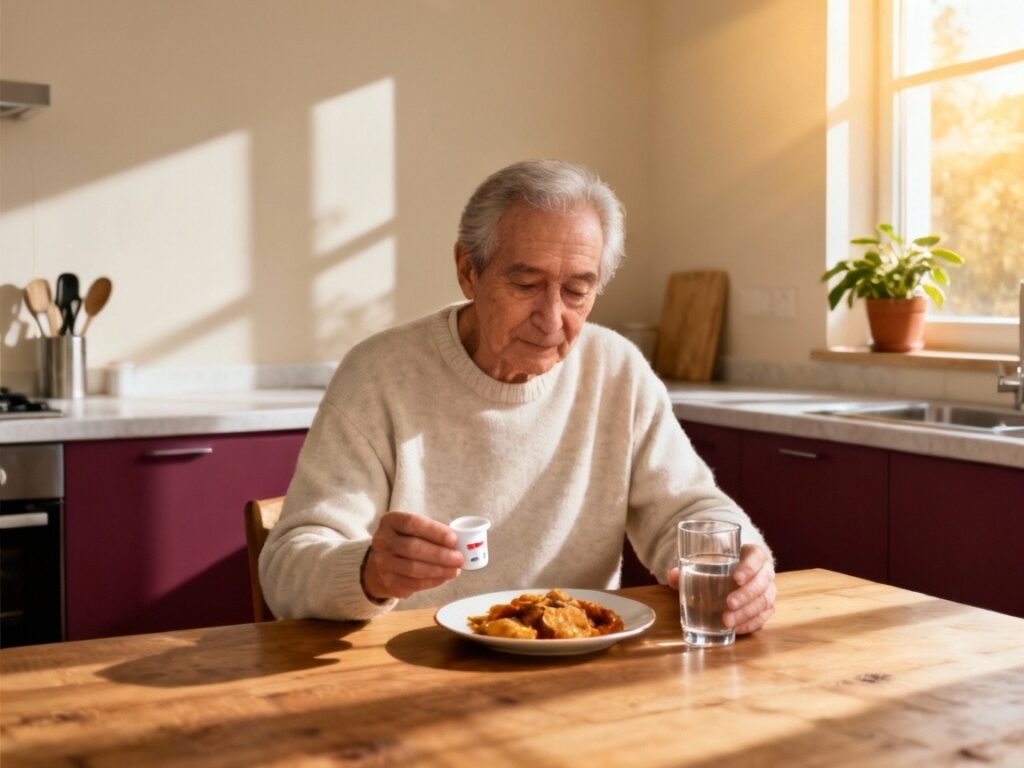When you take your morning medications with breakfast or your evening pills with dinner, you may not realize how much your food choices can impact the way those medications work. The relationship between nutrition and medication effectiveness is both important and often overlooked.
Food can enhance, delay, or block how medications are absorbed in your body. It can change how much medication reaches your bloodstream, how long it takes to work, and in some cases, whether it works at all.
Understanding how nutrition interacts with your medications can help you get the best results from your treatment plan and avoid potentially dangerous side effects.
How Food Affects Medication Absorption

The food you eat could make the medications you take work faster, slower, or even prevent them from working at all. When you swallow a pill, it must be absorbed through your digestive system before it can work in your body.
Food can interfere with this process in several ways:
1. Enhanced Absorption
Some medications work better when taken with food. For example, the fat in meals can help your body absorb certain vitamins and medications more efficiently.
2. Delayed Absorption
Food can slow down how quickly medication reaches your bloodstream. This may not reduce the total amount absorbed, but it can change when the medication starts working.
3. Reduced Absorption
Foods can enhance, delay, or decrease drug absorption, and some foods can actually prevent your body from absorbing medications properly, making them less effective or completely ineffective.
4. Blocked Absorption
Some food components can bind to medication in your stomach, stopping it from being absorbed at all.
Common Food-Medication Interactions That Affect Seniors

Many everyday foods can interfere with how medications work. This is especially important for older adults, who are more likely to take multiple medications.
1. Dairy Products and Antibiotics
Calcium in dairy products like milk, cheese, and yogurt can bind to certain antibiotics (such as tetracycline and ciprofloxacin), reducing how much of the medication your body absorbs. With doxycycline, the effect can depend on the formulation — some are more affected than others, and certain products may even be prescribed with food to reduce stomach upset.
Always check your prescription instructions or ask your pharmacist whether you should avoid dairy around your antibiotic doses.
2. Grapefruit and Drug Metabolism
Grapefruit and grapefruit juice can interfere with the way your body metabolizes many medications. Grapefruit contains chemicals called furanocoumarins, which inhibit an enzyme in your intestinal tract known as CYP3A4.
This enzyme normally helps break down certain medications before they enter your bloodstream. When the enzyme is blocked, more of the medication reaches your bloodstream, sometimes to dangerous levels.Even a modest amount — such as one whole grapefruit or a small glass of juice — can cause problems if you’re taking susceptible drugs.
The interaction may last for up to 72 hours, meaning grapefruit consumed days before can still have an effect. Because not every drug is affected, ask your doctor or pharmacist whether your medication has a grapefruit warning.
3. Blood Thinners and Vitamin K
If you take warfarin (Coumadin) or other blood thinners, foods high in vitamin K can interfere with the medication’s effectiveness. Vitamin K helps your blood clot, which directly opposes what blood thinners are trying to accomplish.
Green leafy vegetables like spinach, kale, broccoli, and Brussels sprouts are high in vitamin K. While these are healthy foods you shouldn’t avoid entirely, consistency is key when taking warfarin.
What to do: Don’t eliminate these nutritious foods, but try to eat similar amounts each week so your doctor can adjust your medication dose accordingly.
4. High-Fat Meals and Timing of Medication
High-fat meals can:
- Increase the absorption of fat-soluble vitamins and certain heart medications
- Decrease absorption of some osteoporosis medications
- Delay pain relief medications that are needed quickly
Knowing whether your medication works better with or without food is essential for proper timing.
Timing Your Medications with Meals

The time you take your medication in relation to meals can make a big difference in how well it works.
Medications Best Taken with Food
Some medications work better or cause fewer stomach issues when taken with a meal:
- Most NSAIDs (ibuprofen, naproxen)
- Certain heart medications
- Some diabetes medications
- Iron supplements (but avoid dairy at the same time)
Medications Best Taken on an Empty Stomach
Other medications need to be taken without food to work properly:
- Most osteoporosis medications
- Certain antibiotics
- Thyroid medications
- Some blood pressure medications
Special Timing Instructions
Some medications are more effective when taken at specific times:
- Thyroid medications are best taken in the morning at least 30 minutes before breakfast.
- Some diabetes medications should be taken 15–30 minutes before meals.
- Certain cholesterol medications are most effective in the evening.
Hydration and Medication Effectiveness

Water plays a crucial role in how medications work in your body. Taking medicine with a full glass of water is recommended unless told otherwise by your pharmacist or healthcare provider.
Adequate hydration can:
- Help medications absorb more efficiently
- Support circulation and kidney function
- Reduce the risk of medication side effects
- Prevent certain medications from damaging your kidneys
Dehydration, on the other hand, can:
- Concentrate medication levels to unsafe amounts
- Make it harder for your kidneys to process drugs
- Increase the risk of side effects
- Make some medications less effective
Alcohol and Medication Safety

Alcohol can seriously affect how medications work in your body. It is especially risky for older adults who may be taking several prescriptions.
Alcohol can:
- Increase the sedating effects of medications
- Affects blood sugar control in people with diabetes
- Increase the risk of bleeding when combined with blood thinners
- Lower blood pressure can occur when combined with certain drugs
- Interfere with pain medication effectiveness
Many medications come with alcohol warnings. These should always be followed carefully to avoid serious health risks.
Supplements and Medication Interactions

Supplements can interact with medications just like food can. Always tell your doctor or pharmacist about any vitamins or herbal supplements you take.
Common Supplement Interactions
- St. John’s Wort can lower the effectiveness of many medications, including birth control, antidepressants, and HIV treatments. It can also lead to serotonin syndrome if combined with certain antidepressants.
- High-dose vitamin E may increase bleeding risk when taken with blood thinners like warfarin.
Even natural supplements can have strong effects, so it is important to manage them carefully.
Practical Tips for Managing Medications and Nutrition

1. Work with Your Healthcare Team
- Keep an updated list of all your medications and supplements.
- Ask your pharmacist about food or drink requirements for each prescription.
- Tell your healthcare provider about your usual eating habits.
- Report any new side effects or concerns promptly.
2. Stay Organized
- Create a schedule showing when to take each medication.
- Note any special instructions like “with food” or “on an empty stomach.”
- Use pill organizers to stay consistent.
- Set alarms or reminders to avoid missed doses.
3. Keep Learning
- Read medication labels and information sheets carefully.
- Ask questions at the pharmacy when picking up new prescriptions.
- Do not hesitate to call your pharmacist if something is unclear.
Every person’s needs are unique. What works for one patient may not work for another. Always follow guidance from your healthcare provider.
When Medication Management Becomes Complex
For people who take multiple medications, managing timing, nutrition, and interactions can feel overwhelming. Different pills may have different food requirements, making it difficult to keep everything straight.
In these situations, professional medication management services can make a big difference. They help ensure that medications are taken correctly, at the right time, and with the right food considerations in mind.
How Senior Life Pharmacy Supports Nutrition and Medication Management

Senior Life Pharmacy offers tools and services designed to simplify complex medication schedules:
- Pre-Sorted Medication Packaging: Your medications are sorted by day and time in clear, easy-to-use packages. This makes it easier to follow food and timing instructions accurately.
- Free Monthly Delivery: Medications are delivered to your door on schedule, ensuring you never run out of essential prescriptions.
- Easy Refill Management: Automatic refills coordinated with your healthcare provider reduce stress and prevent missed doses.
- 24/7 Customer Support: The pharmacy team is available around the clock to help with delivery and packaging questions.
- Same Insurance Coverage: There are no extra charges for packaging or delivery, and your copays stay the same.
By taking care of the logistics, Senior Life Pharmacy helps you focus on proper medication timing, nutrition, and your overall health.
Conclusion
What you eat and drink plays a powerful role in how well your medications work. From dairy and grapefruit to hydration and alcohol, every element of your diet can influence how your body absorbs and processes medication.
By learning how food interacts with your prescriptions, following proper timing, and working closely with your healthcare team, you can get the best results from your treatment plan.
For those managing multiple medications, services like Senior Life Pharmacy can help simplify the process. They make it easier to stay on track, stay consistent, and stay healthy.







